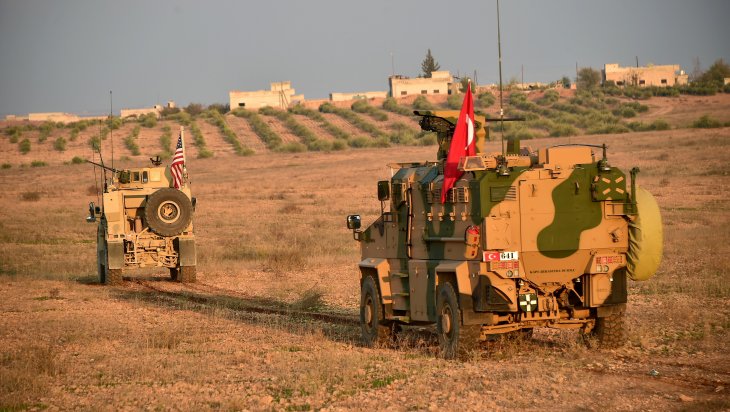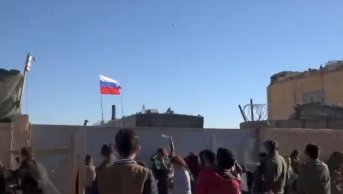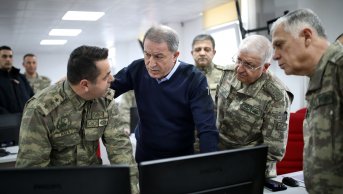Options for Turkey in Manbij and the east of the Euphrates River

One of the most important messages given by President Erdoğan in his speech after the 31 March local elections was about foreign policy. Erdoğan stated that there will be no elections in the following 4,5 years in Turkey and the priority in foreign policy will be given to Syria within this period. The President said that “they are in a period when the efforts on national security would be successful and the current goal will be to eliminate terrorist structures in the east of Euphrates to make the region safer place and ensure that asylum seekers in our country return their homes.” As it can be understood from this statement, there will be taken some diplomatic and military steps regarding the eastern Manbij and Euphrates, which have already been in Turkey’s agenda, and will create concrete changes in the upcoming period.
Turkey’s priority on Syria particularly in the eastern Euphrates and Manbij is to eliminate the control of the YPG and remove the political, military and administrative structure established by the YPG. Instead, Turkey proposes to establish new security and administrative structure as already established in the Euphrates Shield and Afrin. Turkey follows two methods which are complementary and parallel to each other in order to achieve this goal. The first one is diplomacy and the second is the military option.
To solve the problem in the eastern Euphrates and Manbij, Turkey is investigating the option of diplomacy with the conflicting parties to this problem particularly the USA. However, Turkey gives a message that the military option is still on their agenda in order to be strong in the diplomacy table, and if diplomacy fails, there could be a military intervention in the eastern Euphrates and Manbij. Although Turkey’s efforts in this aspect are intended to strengthen its hand for the diplomatic talks around the table, the country seems to be decisive to using a military option if diplomatic initiatives fail.
Turkey is conducting intense negotiations with the US within the context of diplomatic options. The talks are largely carried out among Turkey's Foreign Ministry, the US State Department and US Special Envoy to Syria James Jeffrey and among the Turkish Ministry of Defense officials and US Department of Defense officials. Even though the US State Department and James Jeffrey’s team are essentially more willing to work with Turkey, there are some comments that the US Department of Defense and CENTCOM officials have a deep distrust of Turkey and even that they do not regard Turkey as their partner in Syria. Due to the blocking by the US security bureaucracy, the negotiations between Turkey and the US cannot yield results in Syria.
In fact, Turkey and the United States signed an agreement that provided for their cooperation in Manbij and the east of Euphrates. According to this; The YPG and PKK-affiliated armed elements will withdraw from Manbij to the east of the Euphrates, the YPG and PKK-related names in the Manbij Civil Council will be dismissed, the security in Manbij will be ensured by both the Turkish and American troops in coordination, and eventually the structure being implemented in Manbij will be applied in the YPG regions in the east of the Euphrates at later stages. Despite this agreement reached between the Turkish Ministry of Foreign Affairs and the US State Department, there has been little progress on Manbij issue because of the obstacles put forward by US military circles. Until now, the Turkish and US armies have jointly patrolled in Manbij borderline with the Euphrates Shield area, and the two countries have also identified and dismissed some of the figures who are affiliated to the YPG/PKK in the Manbij Civil Council. Due to the delays in Manbij, the Turkish party is of the thought that she is being stalled and therefore considers a direct unilateral military intervention in the east of the Euphrates rather than wasting time in Manbij. However, Trump’s decision to withdraw from Syria prompted Turkey to delay the military option she had been pondering upon. After the US decision to withdraw, the US and Turkey continue negotiations based on the new situation. In this process, the US has proposed the creation of a safe zone with a depth of approximately 30 kilometers in the east of the Euphrates from the boundary line. Although this proposal is theoretically supported by Turkey, it seems that what Turkey and the US understand from the term “safe region” differ from each other.
From the Turkish perspective, there should remain no YPG/PKK elements in the safe zone and the military control in the region should completely belong to the Turkish army. For, Turkey sees this region as an intermediate formula to strengthen her hand for later operations against the YPG. Indeed, for Turkey, the fight will not stop until every region under YPG control is taken from the organization. The US, on the other hand, evaluates the region as a “buffer zone” that could prevent further Turkish military operation against the YPG, would let the US still directly or indirectly dominate the region and that could also decrease the security concerns of Turkey. The US army, therefore, opposes the entry of the Turkish army into the safe zone. The US wants the military control in this region to be an international force that will consist of the armies of European countries such as Britain and France. It recommends that local security is provided by the Arab elements in the SDF or the “Rojava Peshmergas” which was founded and is supported by the Iraqi Kurdish Party KDP. From the perspective of Turkey, even though the SDF Arabs and Peshmerga forces may work together, she strongly opposes that the control is in the hands of an international force. Turkey thinks that through such a structure the West would provide YPG with international protection through the buffer zone. This brings about a concern among the Turkish decision makers that a process similar to that of northern Iraq may occur and let YPG gain political status. Therefore, Turkey considers the control’s being in the hands of the Turkish army as the red line. Because of the differences of opinion between the US and Turkey, the negotiations cannot produce any definitive outcomes.
Turkey is also diplomatically in contact with Russia about Manbij and the east of Euphrates. Russia's preference for Manbij and the East of Euphrates is that the Syrian regime forces to fill the gap on the borderline. In this regard, Russia proposes the implementation of the Adana Agreement which was signed between Turkey and Syria in 1998 and provides for cooperation against terrorism. However, from the Turkish perspective, Syrian forces are not a reliable actor. The Adana Agreement was essentially carried out with the utmost success in the long term in terms of Turkey and it is one of the texts that could form the basis for the Turkey-Syria relations. After 1998, Syria indeed developed close cooperation with Turkey in combating the PKK and that laid the groundwork for the Turko-Syrian rapprochement for the next decade. Today, however, there are three main problems in the implementation of this agreement. First, the Syrian state is not as strong as it was in that period and it cannot spread its authority upon the whole country. Therefore, in the eyes of Turkey, Damascus cannot be an effective partner in the fight against YPG/PKK which has gained excessive strength and been backed up by the United States. Secondly, Turkey-Syria relations was based on mutual trust at that period. Today, it is the opposite, and it will take a long time to build trust between the two sides even if a political solution is reached. Especially considering the fact that in the early stages of the civil war, Damascus let the YPG mobilization and even supported it, and that the two still have regular discussions to reach a political consensus, it is clear that Syria will not be a reliable partner for Turkey. Finally, the US wants that the vacuum which will emerge with its withdrawal from Manbij and the east of Euphrates be not filled by Syrian and Iranian forces. Therefore, it is not possible for the Syrian forces to settle in this line without receiving the US’s approval. Under these conditions, the Adana Agreement and the deployment of the Syrian forces on the borderline will not be the case for now. Due to the continued cooperation with Russia on Syria, Turkey, however, will want to take steps in coordination with Russia in Manbij and the east of Euphrates. If Russia also takes some security guarantees, she may be expected to give the green light to the Turkish control over the Syrian borderline.
Under these circumstances, it is possible that one of the two scenarios regarding Manbij and the east of Euphrates will take place. In the first scenario, Turkish and US sides will agree on the safe zone. Thus, the YPG elements will withdraw from Manbij and the safe zone, and the control will be transferred to the forces determined by Turkey and the US. The military control in the safe zone will be largely in the hands of the Turkish army, but this control will be achieved through the agreement, not through a military operation. Albeit in their limited number, in the security structure to be arranged in here, there could be non-Turkish military forces from other countries. In the case of local security, some US-backed armed structures other than the YPG may play a role. However, due to several reasons such as the increasing distrust between the US and Turkey, other issues beyond Syria, and the negative role that the US security bureaucracy plays concerning cooperation with Turkey, the likelihood of this scenario is decreasing each passing day.
According to the second scenario, which has a higher probability, Turkey will carry out a military operation in the east of the Euphrates unilaterally and will set up the safe zone she has been planning to create. In such a case, Turkey may be expected to target several settlements such as Tell Abyad, Ayn al-Arab surrounding, Ras al-Ayn and certain strategic points on the borderline. Turkey will take a step against the US demands in this scenario, and most probably it will be coordinated with Russia. Within the framework of the agreement to be reached with Russia, Turkey will not move away from a certain depth and will confirm her commitment to the territorial integrity of Syria as in the Astana process.
Even though the second option is more likely, we can assert that it is not the first choice for Turkey. For such a scenario has the potential to create a breakup in US-Turkey relations which are already going through perhaps one of the worst periods in their history. It is obvious that this will have negative consequences for both countries. But on the other hand, to Turkey, YPG/PKK problem is not an issue on which she could make concessions. Turkey believes that she has the capacity to pay more price in this issue as she sees it pretty much vital. Thus, if the negotiations with the United States are not successful, the second scenario is likely to be on the agenda. In fact, the negotiations between Turkey and the US on the Syrian civil war should be regarded as a part of the general relations between the two. However, this issue is so critical that it directly affects the course of other topics. If Turkey and the US fail to work together on Syria, the S-400 and F-35 crises will deepen and as such a failure would bring about a snowball effect, this will mean more confrontation in Syria between the two countries. In the opposite case, if they manage to create a safe zone in Syria together, we may expect for a relaxation of the relations regarding the solution of other problems.









